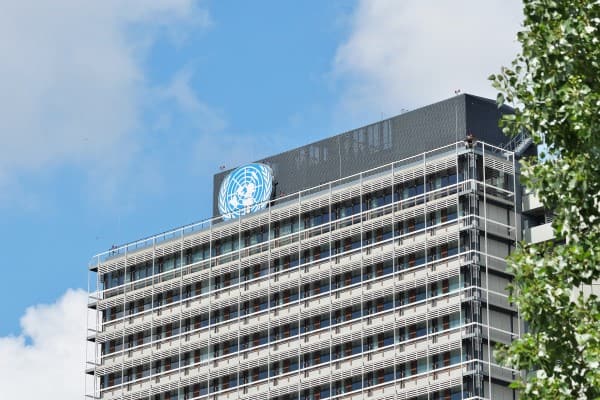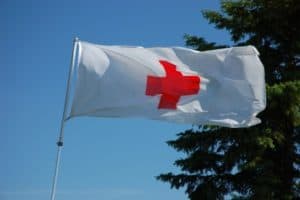This page contains affiliate links. This means if you a follow a link and make a purchase, at no additional cost to you, Humanitarian Careers will receive a commission. Thank you for supporting the site.
The United Nations is the most powerful and important international organisation in the world. Its aim is to achieve global peace and security. The UN has roles in writing international laws, issuing resolutions against countries, assisting with global development, and deploying armed peacekeepers. All of which begs the question, is the United Nations a world government?
The United Nations is not a world government. It does not rule over, tax, or police the global population. It also does not govern over defined borders or a community. The UN is controlled by member states and does not have authority over them as an international government would.
Now we know the UN is a not a global government, let’s take a look at why it isn’t, as well as what role the United Nations actually does play in global governance. We’ll also explore why some people think the UN is an international government.
Why the United Nations Is Not A World Government?
The first reason why the United Nations is not a world government is that it does not control countries. In fact, it is the opposite. The UN is directly controlled by member states. The UN can only take action if directed by member states. This means the UN cannot be a global government, as it doesn’t have the power to act over national governments.
The second reason why the UN is not a world government is that it does not raise taxes.
Collecting taxes from a population is one of the defining acts of a government and the United Nations does not raise funds directly from people around the world. The United Nations is funded by contributions from member state governments. For the UN to be a global government it would need to levy taxes on people around the world. It doesn’t.
A further reason why the UN is not an international government is because it is ultimately accountable to member states, not the global population.
Although the UN works for all the people of the world, it actually reports to, and is held to account by, the national governments of member states. Being answerable to the population it oversees is a key part of being a government. Because the UN is only actually accountable to member states, it cannot be a world government.
The United Nations is not a world government because it does not have the right to use force on its own account.
The sole right to legitimately use violence is one of the things that makes a government. Essentially, governments, through the police force and army, are allowed to use violence when it is required. The UN cannot do this. The UN can only deploy forces when directed by member states and at the invite of national governments. This is a key reason the UN is not an international government.
Another reason why the UN is a not a global government is because it does not rule over a population. A common definition of a government is…
‘’the political system by which a country or community is administered and regulated’’.
Encyclopaedia Britannica
This does not apply to the United Nations. The UN does not rule over a defined community of people. It does not protect borders or set laws that control how a single group of people live. This makes the UN very different from a national government.
The United Nations is a multilateral organisation. This means it takes decisions based on the position of multiple parties. This is another reason why the UN is not a world government. Governments often take unilateral decisions – acting out of their own interests. The UN doesn’t do this. It aims to ensure dialogue between nations, rather than acting in the best interests of only one position. If the UN was a world government, it would act unilaterally to make decisions for the whole world.
A final reason why the UN is not an international government is that the United Nations cannot recognise a sovereign state in its own right.
Member states are only admitted to the UN with the agreement of current members. This means that if a new territory declares itself an independent country, the UN cannot recognise it unless its member states do. This is different to governments who can make their own decisions over recognising the sovereignty of other countries.
The UN’s Role in Global Governance
Although the United Nations is not a world government, it does play a role global governance. Let’s take a look at how the UN is important to global governance, but in ways that are very different to how a world government would act.
The United Nations is a forum for dialogue between countries. It aims to achieve global peace and security through international cooperation. Acting as an arena where nations can solve their disputes without resorting to conflict is probably the most important role the UN plays in global governance. However, it’s role as a forum for international dialogue is not the same being a world government.
Another role the UN plays in global governance is in making international laws. The UN is the custodian of a wide body of international law that supposedly governs how states should act. However, the UN’s role in international law is very different from being a world government. The UN only makes laws approved by member states and only countries that sign-up to the treaties are legally bound by them.
The UN does not make international laws in the way a global government would.
The United Nations has an important role in when crises or disasters strike. This is another way that it is involved in global governance. Through mediating between conflicting parties and providing emergency humanitarian relief, as well as issuing resolutions against states, the UN aims to resolve crises and limit the extent of human suffering. However, it must do this through dialogue and with the cooperation of member states. This shows the limits of the UN’s power.
The UN has a part in economic governance with agencies specialising in improving the economic outcomes for both developed and developing nations.
The World Bank and International Monetary Fund are key UN institutions that play an advisory role in global economic management. Importantly, they do not have any economic oversight and can only make suggestions or provide assistance if requested. They do not have any economic control over member states.
One of the aims of the United Nations is to assist in global development. The UN has specialised agencies that work with poorer countries to assist with development, as well as agencies that run projects to alleviate poverty and empower communities. The UN’s work in development is a key part of its role in global governance. However, all UN development work is done in cooperation with member states. The UN does not direct how development is undertaken, as an international government would.
The final important role the UN has in terms of global governance is ensuring dialogue with other international organisations.
The UN is not the only international body that acts as a forum between countries. Other examples include the European Union, African Union, G20, NATO and ASEAN. Organisations such as these have their own specific mandates. The UN works closely with other multilateral bodies on many areas. UN does not, however, have oversight of any of these organisations, as an international government would, but works alongside them.
United Nations Online Courses
If you want to learn more about the United Nations, and why the UN is not a world government, we highly recommend the online course Global Diplomacy: The United Nations in the World offered by SOAS in London. We think it provides one of the best overviews of the UN and its role in the current global order. SOAS is also one of the top universities in the world for international relations and courses related to the UN.
The Sustainable Development Goals (SDG) underpin all of the UN’s work. In order to fully understand the United Nations, and why it is not a world government, you need a basic understanding of the SDG. We think the online short course The Sustainable Development Goals – A Global, Transdisciplinary Vision For The Future offered by the University of Copenhagen is one of the best introductions to the SDG.
The University of Leiden in the Netherlands offers an online short course on The Changing Global Order. It includes a specific look at how shifting international power dynamics are affecting the current global system and the United Nations. For those wanting to understand the challenges the UN faces, this online course is a must.
Why Do People Think The United Nations Has Global Control?
Although the United Nations is not a world government, there are some people who think it is. This is partly because the UN’s structure mirrors that of a government, and this can cause confusion. However, there is also widespread misunderstanding about the role of the United Nations as well as some fringe conspiracy theories.
Let’s take a quick look at each area and try and explain some of these misconceptions.
Firstly, the UN is structured in a similar way to a government. It has a legislature, executive and judiciary. These are the General Assembly, Secretary General, and the International Court of Justice respectively. However, they are very different to the legislature, executive and judiciary of a government. The similar structure of the UN does result in some confusion as to whether the UN is an international government or not.
The General Assembly of the United Nations is the policy making body of the UN. In many ways it works like the UN’s parliament. It appoints the executive – the General Secretary and passes UN resolutions. It also approves the UN’s budget. All member states are represented in the General Assembly.
Importantly, the UN General Assembly is not a global parliament. The world’s population does not vote for members to the General Assembly, it does not pass laws for individual citizens and does not raise taxes. Many people see the General Assembly and think the UN is a global government because it mimics a national parliament. However, the function, and power, of the General Assembly is very different.
The UN Secretary General is the formal figurehead of the United Nations. The position tops the UN’s executive. If the UN had global control, then the Secretary General would be the World President. This is definitely not the case. In fact, the Secretary General has little formal power and is mainly at the behest of member states. The Secretary General is really a mixture between CEO, bureaucrat, advocate, and civil servant.
Another area of the UN’s role in global governance that can confuse people is the International Court of Justice and the UN’s role in international law.
The UN does make some international laws. However, international laws made by the UN only apply to member states governments, not individuals. Also, countries stick to international law by consent, as there is no judicial procedure or enforcement agency. The UN does not make laws for the world or is a global police force.
Some people misunderstand the limits of the UN’s power when it comes to international law. This is partly due to the International Court of Justice being a key part of the UN. However, the international Court of Justice is not a criminal court and does not try individuals accused of crimes. The role of the International Court of Justice is to judicate between countries that refer themselves to have it resolve their disputes.
Many people also misunderstand the role of UN peacekeepers and believe this is an army operated by the United Nations. This adds to the confusion over whether the UN is an international government.
United Nations peacekeepers help countries retain peace and security. They protect civilians, prevent a resumption of conflict, aim to reduce violence, and strengthen national security forces. UN peacekeepers are not peace enforcers or peace builders. They are almost always mandated to monitor and reinforce peace agreements made between warring parties.
UN peacekeepers cannot take aggressive military action. They cannot invade or take over a country or fight battels against national armies or armed groups unless they are directly targeted themselves. Forces for UN peacekeeping operations are provided by member states and remain members of that countries armed forces. Some people think UN Peacekeepers are the UN’s army, in the way an international government would have an army. This is not correct.
Finally, as well as people who misunderstand the role of the UN and extent of its global power, there are a range of conspiracy theories that see the UN as a world government. These are almost all completely incorrect. A leading conspiracy theory sees the UN as part of a New World Order. Adherents believe the United Nations is part of plan to rule the world as an authoritarian one-world government.
There are a huge range of reasons why some people believe conspiracy theories about the UN and say it aims for world domination, but these will have to be explored another day…
If you want to learn more about the United Nations, and why is it not a world government, explore our list of the top UN online courses here.




